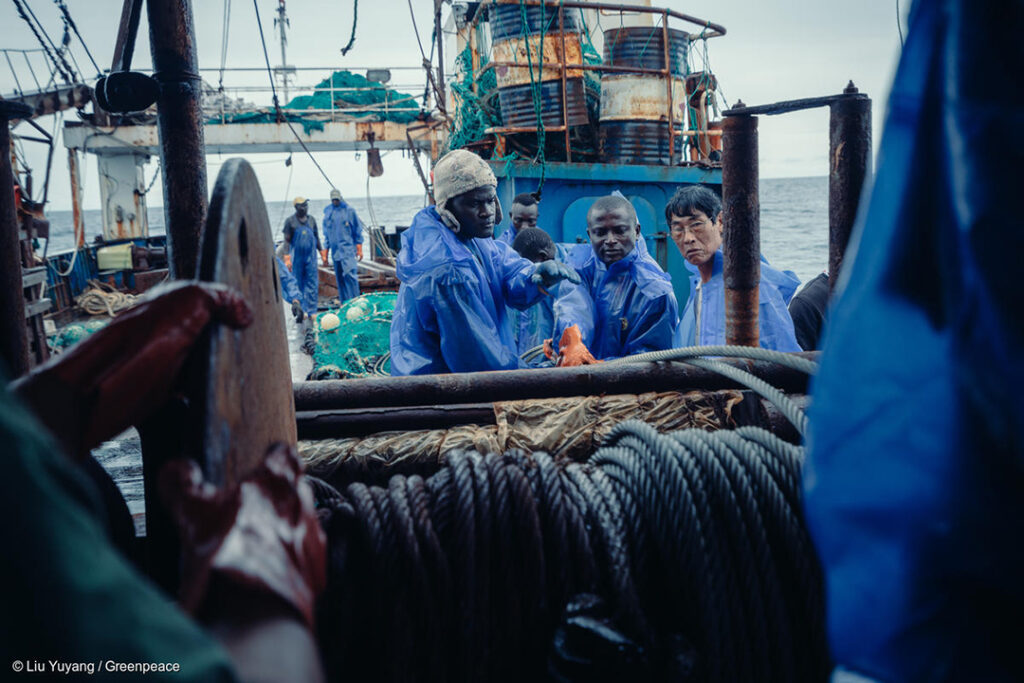ADF STAFF
Bright Tsai Kweku knows well the perils of working on board a Chinese-owned fishing vessel in Ghana.
He said he witnessed one crew member die of cholera because the Chinese crew would not take him to shore for treatment. He saw one crew member die of severe burns and another perish after being injured by a propeller.
Kweku, who works as an officer in charge of equipment and the crew, told the BBC he has been ordered to work three days without sleep, had food withheld and forced to drink dirty water. He said Chinese crew members routinely treat local fishermen like “slaves.”
“They beat them, they spit on them, they kick them,” Kweku says. “I have been through that before.”
Similar stories have been shared for years.
A fisherman named Michael recounted a terrifying ordeal in May 2022, when he was working on the Chinese vessel MV Comforter 2. The trawler was fishing during heavy storms and the crew ordered the fishermen to pull in an excessive haul. Already loaded with fish, the boat capsized because of the weight of the catch and choppy waters.
Michael and nine others held onto a floating oil drum for nearly 24 hours before they were rescued. Eleven people remain missing, although the body of the Chinese captain was recovered.
“It was a terrifying night,” Michael told the BBC. “We didn’t know whether we would make it or not.”
Michael said he has not recovered from the ordeal, mentally or physically.
Steve Trent, founder and CEO of the Environmental Justice Foundation, said the high number of Chinese-owned trawlers is an issue across West Africa, but the problem is “particularly acute” in Ghana.
“These Chinese owners have commonly put a Chinese captain in charge of the vessels to command the mainly Ghanaian crew and it is these Chinese captains that have driven the abuse,” Trent told the BBC.
One notorious case of alleged abuse aboard a Chinese trawler involved Ghanaian fisheries observer Emmanuel Essien, 28, who was on board the Chinese trawler Meng Xin 15 when he captured video of the crew engaging in saiko, the illegal transfer of fish from a trawler to a large canoe. Two weeks later, on July 5, 2019, he went missing while working on the same vessel.
Essien’s evidence could have meant a $1 million fine for the vessel’s captain, according to The Guardian. There has been no sign of Essien since he went missing. His family believes he was murdered in retaliation for submitting the video to authorities.
In mid-January, Mavis Hawa Koomson, Ghanaian Minister of Fisheries, announced that trawler owners will not be licensed to fish in Ghana if they abuse fishing observers. Koomson pledged that all abuse and human rights-related complaints lodged against any industrial vessel operator will be investigated with sanctions applied when necessary.
“Abusing a fishing observer is just like abusing me, the Minister, because the observers are representing me,” Koomson told Ghanaian television station MyJoy. “When you abuse them, you are not worth operating on the water. We shall not hesitate to withdraw your license if you have gained notoriety in abusing people I have put on the vessels to monitor.”
Besides human rights abuses, Chinese trawlers in Ghana and around West Africa steal tons of fish from the sea through illegal, unreported and unregulated (IUU) fishing, which threatens livelihoods, decimates fish stocks and decimates ecosystems. China is the world’s worst IUU fishing offender, according to IUU Fishing Index.
Analysts say 40% to 60% of all fish caught in West Africa are illegal catches. According to a new report by the Financial Transparency Coalition, more than 40% of the world’s IUU fishing happens there. The region loses anywhere from $2.3 billion to $9.4 billion annually to illegal fishing.
The foundation says that in Ghana, 90% of illegal fishing boats are Chinese-owned.

